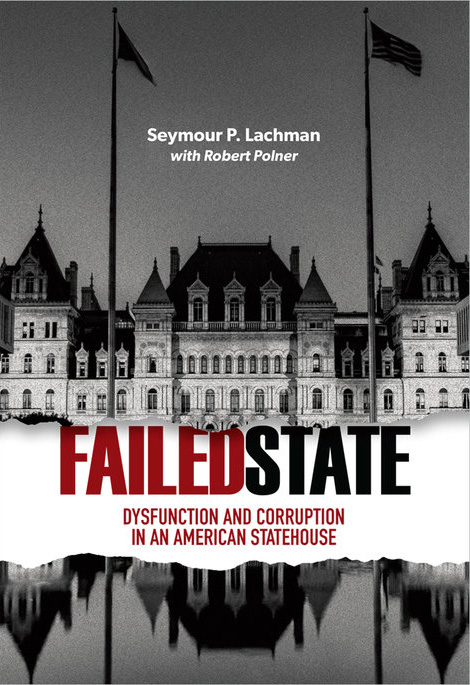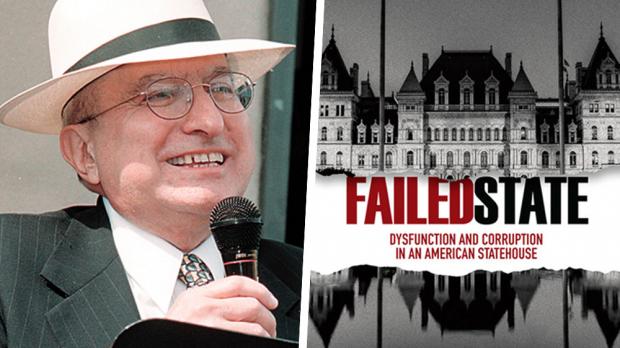Seymour Lachman's Failed State
 After serving in the state Senate for more than a decade, Seymour Lachman was disillusioned with how things worked in the state Capitol and left office to return to academia. In 2006, he published Three Men in a Room, his account of the behind-the-scenes decision-making process controlled by the governor and legislative leaders. Now the director of the Hugh L. Carey Institute for Government Reform at Wagner College, Lachman is out with another book that renews his critique of Albany—and suggests various solutions and reforms. City & State’s Jon Lentz spoke with Lachman about the growing number of lawmakers convicted of corruption, the control legislative leaders have over their members, and how a constitutional convention could actually clean up Albany.
After serving in the state Senate for more than a decade, Seymour Lachman was disillusioned with how things worked in the state Capitol and left office to return to academia. In 2006, he published Three Men in a Room, his account of the behind-the-scenes decision-making process controlled by the governor and legislative leaders. Now the director of the Hugh L. Carey Institute for Government Reform at Wagner College, Lachman is out with another book that renews his critique of Albany—and suggests various solutions and reforms. City & State’s Jon Lentz spoke with Lachman about the growing number of lawmakers convicted of corruption, the control legislative leaders have over their members, and how a constitutional convention could actually clean up Albany.
C&S: You’re the author of a new book, Failed State: Dysfunction and Corruption in an American Statehouse. Why did you write this new book?
Well, what prompted me was the stark reality that things are getting worse, because of a lack of a real democratic process in the state Legislature. Things have worsened rather than improved. Let me give you a glaring example of what I mean. You take a period from 1980 to 1995, before I entered the state Senate in 1996, you had convictions of four members of the state Senate. Ten years later, when I served in the state Senate, that decade, there were two convictions of state senators—and that’s not misdemeanors, that’s felonies. But when you view the last 10 years, from 2005-06 to 2015-16, you see 16 convictions of felony crimes committed by members of the state senate. For the first time in New York State history, you had a Senate majority leader convicted two weeks after an Assembly speaker. That has never happened before, and I’m trying to find out if any other state has that.
Now I’m not saying New York has the worst state government. Over the last generation, Illinois has had three ex-governors in jail. We’ve never had that, but we came close to that with Eliot Spitzer. It never occurred. So I’m not saying the entire state government is the worst and corrupt, but I am saying that in the New York state Legislature, it is the worst in the nation. And recent studies at major universities have revealed that to be true.
C&S: The governor recently argued that New York does have independent oversight, with the district attorneys and the state attorney general and US attorneys.
Well, we don’t have an effective, independent body like a Congressional Ethics Committee. We lack that, and because of that many things occur that might not be illegal but are unethical. And sometimes this goes beyond the line. I can you a few examples of that. In the only legislature in the nation—and I’m saying this with a great deal of study and even some hesitation—no bill has ever passed in the Senate or the Assembly in the decade that I was a member of the Senate without the support of the majority leader. The same holds true in the Assembly. No other legislature exists where leaders appoint all the chairs of all the committees, as well as committee members. Nothing else exists such as the budget process in the New York State Senate and Assembly.
In preparation of the last budget that I had to vote in when I was in the Senate in 2005, the meeting of the Finance Committee occurred a half hour before the budget was to go to the floor. And guess what? We were given a telephone directory of over one thousand pages of the budget for the coming year. Today the budget is about $154 billion. It was somewhat less then, but it was over $100 billion. And we were told, “You have to vote for this and you have to vote for it in a half hour.” And the chair of the committee said, “You’re very lucky, you can read it, and the other legislators who aren’t on the Finance Committee, they’ll come to the Senate chamber and they’ll have to immediately vote on it.” Some of us said, “This is crazy! How can we possibly do anything?” In New York State, you can’t even amend the budget without the support of the three men in the room: the speaker, the majority leader, and the governor. And you know what the chair of the Finance Committee’s response was? He said, “Well, your leaders, our leaders, have all approved it.”
C&S: In your book, you write that one of the best ways to clean up Albany would be to hold a constitutional convention.
The reason why it’s critical is that no substantive changes will take place in the current process that exists, and the current control by two of the three men in the room, unless change is brought about by an outside group. Every 20 years there can be a vote on changes through a constitutional convention. Things are getting worse in the democratic process, in the malfunction and dysfunction of the two bicameral legislative houses, and the only way this can be eliminated is through a state constitutional convention.
Jon Lentz is editor of City & State, a content partner with The Public.

